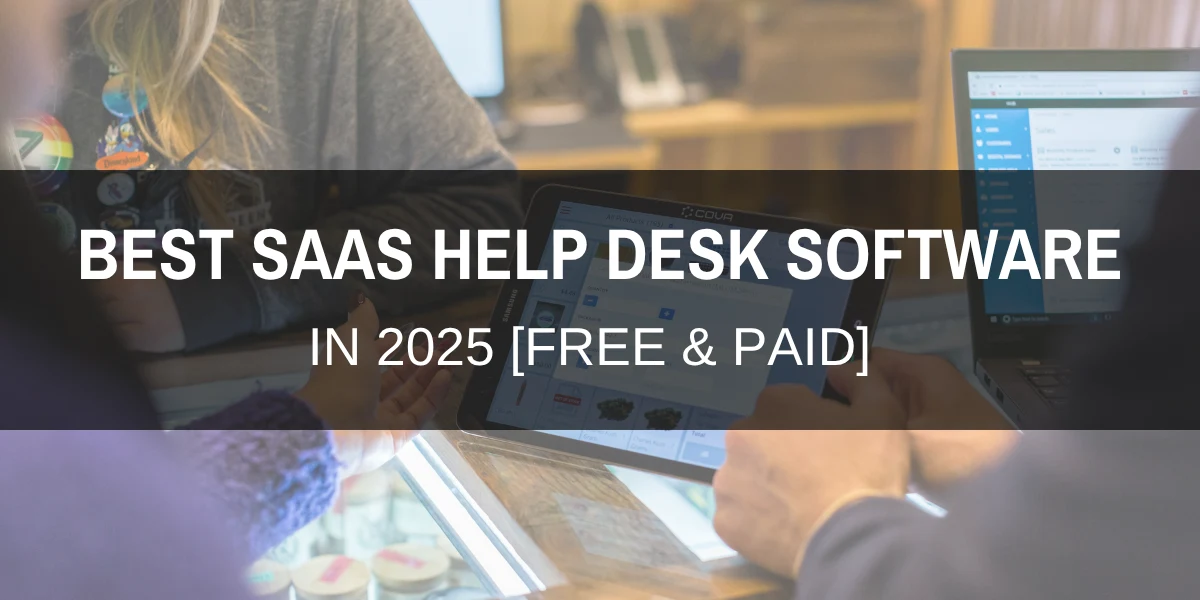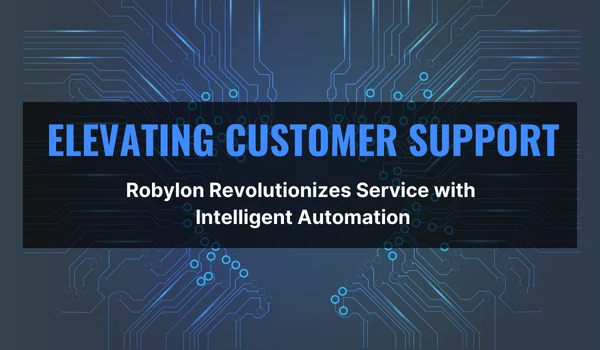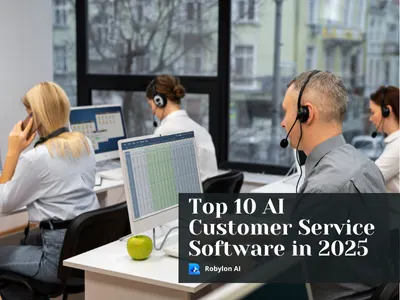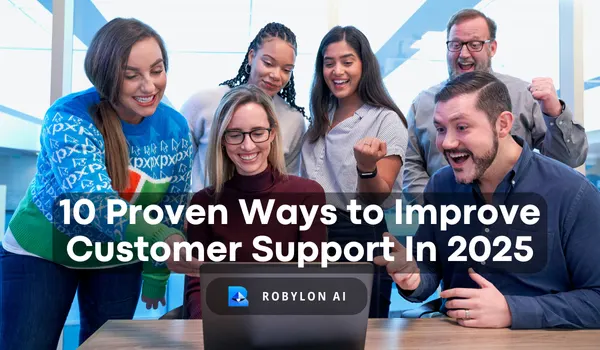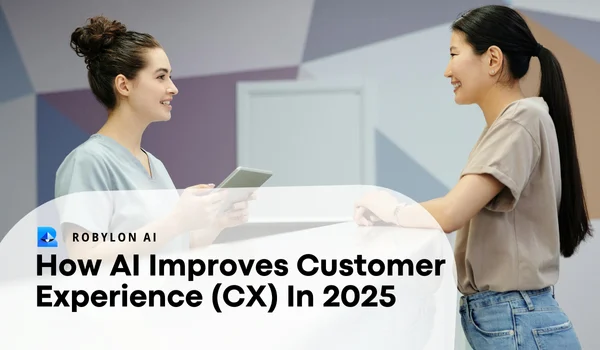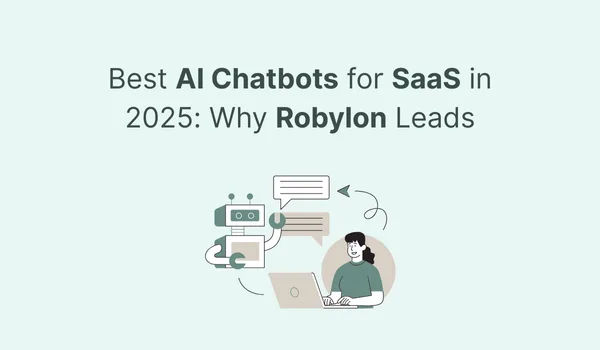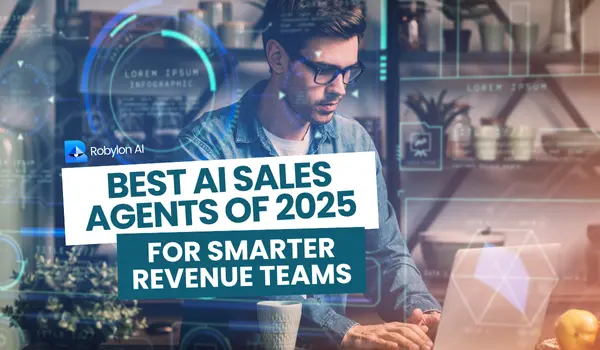TL;DR
Choosing SaaS support software in 2025 is about speed, scale, and measurable outcomes. In this blog, you’ll find fast-setup picks for remote teams, AI-powered options with per-ticket/per-resolution pricing, and omnichannel platforms that unify email, chat, WhatsApp, and voice without losing context.
The list covers 11 platforms: Robylon for AI-first automation; Zendesk for enterprise omnichannel; Freshdesk for value and ticketing depth; Intercom for messenger-led, proactive support; Help Scout for a human shared inbox; Zoho Desk for budget-friendly automation; HubSpot Service Hub for native CRM alignment; Salesforce Service Cloud for complex workflows; Gorgias for ecommerce-style operations; HappyFox for a clean all-in-one setup; LiveAgent for chat-first teams with built-in telephony.
Introduction: Why support stacks changed in 2025
Customers now message on chat, email, WhatsApp, social media apps, and phone, often in the same hour. Teams must keep context, answer fast, and prove results. That shift turned support from a cost center into a performance engine. Modern customer support platforms and customer service tools succeed when they cut effort for users and agents while exposing clear, measurable outcomes like CSAT, AHT, and first-contact resolution.
SaaS products also run 24/7. That reality demands coverage across time zones, languages, and devices. It pushes teams to combine helpdesk ticketing systems with self-service, automation, and analytics. Tooling choices now shape onboarding quality, renewal health, and expansion revenue. In short, your service desk software is part of the product experience.
If you want to automate support with AI customer service tools, explore our detailed article on 10 Proven Ways to Improve Customer Support in 2025.
What is a SaaS support tool?
It is customer-facing help desk software that centralizes conversations and resolutions across email, chat, WhatsApp, voice, and in-product messages. It helps SaaS teams handle onboarding questions, usage issues, billing queries, and renewals end-to-end. Unlike ITSM suites built for internal IT tickets, SaaS support tools optimize for external users, product context, and revenue outcomes such as retention and expansion.
A modern stack typically includes: omnichannel inbox and helpdesk ticketing systems; knowledge base software and in-app tips for self-service; live chat and messenger; automation (routing, macros, workflows); AI for suggested replies and deflection; reporting & analytics for CSAT, AHT, and FCR; and deep CRM integration to surface account data and SLAs.
Prefer a tailored shortlist based on your channels, volumes, and KPIs? Book a demo.
Methodology: How we evaluated the tools
This section shows how to choose help desk software using clear, repeatable criteria. Each pillar includes what features matter for Saas support when you need speed, scale, and measurable outcomes.
- Omnichannel support (email, chat, social, WhatsApp support, voice support/contact center): Consolidates conversations and preserves context. Cuts repeat explanations and handoffs.
- Ticketing system depth + workflow automation: Robust queues, SLAs, priorities, routing, macros. Reduces toil and time-to-resolution.
- Knowledge base software + chatbot integration: Self-service and ticket deflection AI that resolves routine queries before they hit human agents.
- AI help desk software capabilities: Gen AI help desk, autonomous support agents, and an AI chatbot for support that summarizes, suggests, and resolves.
- Reporting & analytics, CSAT tracking, SLA management: Baselines, targets, and drill-downs for continuous improvement.
- CRM integration, ecosystem, and reliability: 1-click context from account, plan, usage, and billing. Lowers back-and-forth, boosts personalization.
11 help desk tools for SaaS companies 2025
1. Robylon - Best for AI-first automation across your stack
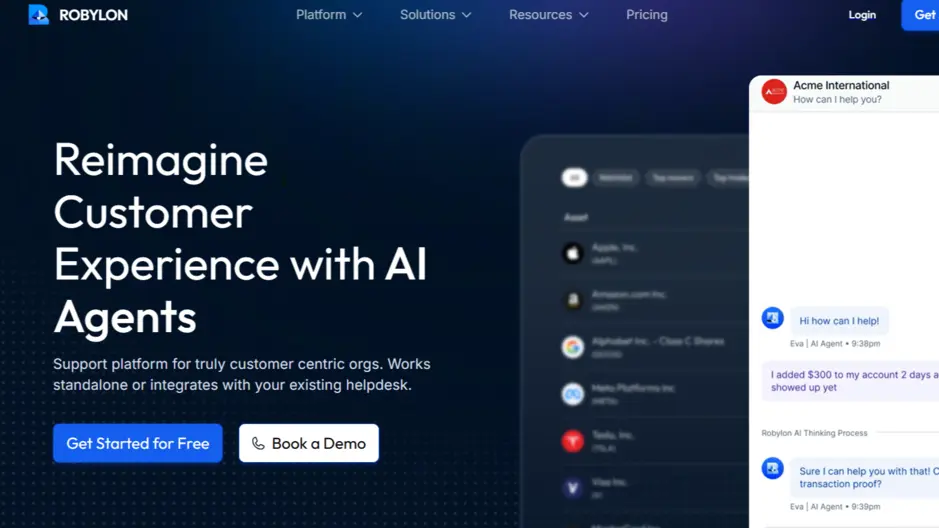
Robylon pairs customer support tools with autonomous AI agents to resolve Tier-1 queries across Chat, Tickets, WhatsApp, and Voice. This means ~70-80% of the queries are resolved by AI agents in real time, without the need for any human support. It adds AI ticket deflection and no-code AI agent copilots to your current knowledge base and helpdesk ticketing systems.
Key features
- Omnichannel automation: Web chat, email, social media, WhatsApp, and voice with unified transcript & context
- AI chatbot for support with answers from the Knowledge Base/CRM
- Smart routing & workflow triggers, macros, and auto-summaries for faster average handle time (AHT)
- Analytics, CSAT, multilingual support, API/CRM integrations
Pricing: Starter $0/mo (~60 chats or 50 ticket replies, 1 AI agent), Pro $39/mo (2k credits, 5 AI agents), Business $199/mo (12k credits, 10 AI agents), Custom enterprise plans.
Pros: Fast time-to-value; measurable gains in CSAT/AHT; deep CRM integration.
Cons: Works best when your KB and processes are reasonably structured.
Best for: SaaS startups, B2B SaaS enterprises, high-volume support, product-led growth (PLG) companies.
Need more details? Explore; How Robylon Transforms Customer Support.
2. Zendesk - Best for enterprise omnichannel scale
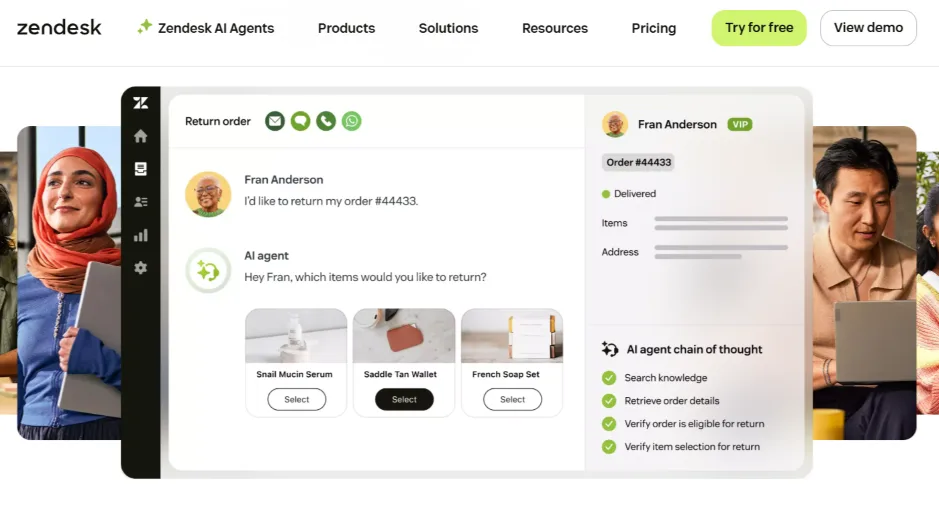
A mature customer service platform with omnichannel support, with a robust ticketing system and SLAs.
Key features
- Omnichannel: email, chat, social, WhatsApp, voice/contact center
- Ticketing with macros, side apps, SLAs, and approvals
- Knowledge base & help center; AI-powered triage and “Advanced AI” add-on
- Enterprise analytics (Explore), 1,500+ marketplace apps
Pros: Feature breadth; reliability at scale; strong ecosystem.
Cons: Admin complexity; costs can climb with add-ons.
Pricing: Suite Team from $55/agent/mo; legacy Support Team from $19/agent/mo. Professional $115; Advanced AI and high-tier capabilities add cost; Enterprise/custom available.
Best for: Enterprise, high-volume support, remote teams.
3. Freshdesk - Best for powerful ticketing with great value
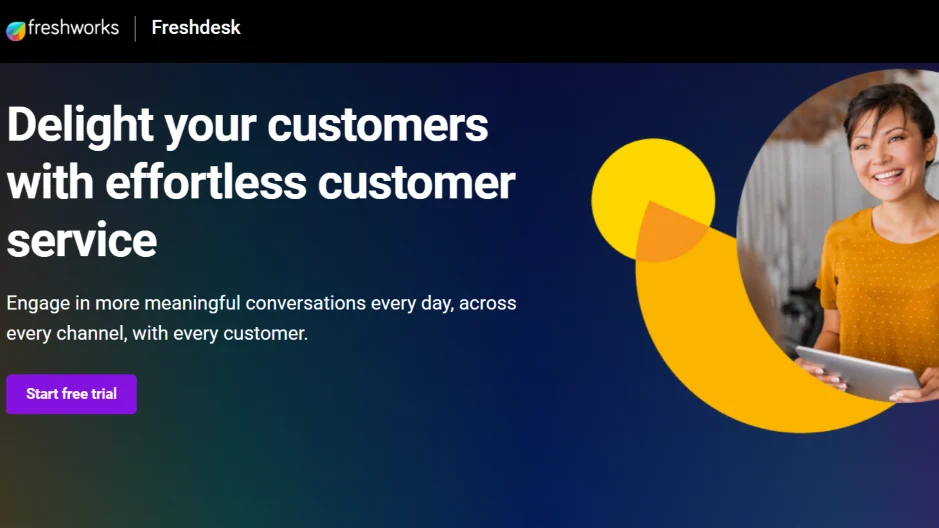
Freshdesk mixes multichannel ticketing, knowledge base software, with solid automation, SLAs, and the Freddy gen AI help desk.
Key features
- Multichannel ticketing & Freshchat live chat
- Skill-based routing, collision detection, canned forms
- KB & self-service, SLA management
- Freddy AI: summaries, suggestions, deflection flows
Pros: Excellent value; easy to launch; strong automation primitives.
Cons: Some advanced features live on higher tiers.
Pricing: Free plan; Growth $15, Pro $49, Enterprise $79 per agent/month when billed annually.
Best for tags: Small businesses, saas startups, and remote teams.
4. Intercom - Best for messenger-led, proactive SaaS support

Intercom excels at in-product messaging with live chat software, behavioral outreach, and an AI agent that handles routine queries.
Key features
- Unified inbox; in-app messages, product tours, surveys
- Fin GPT-4 chatbot, content-synced to your help center
- Workflow builder, multilingual support, app ecosystem
- Reporting on resolution, deflection, and engagement
Pros: Elite UX; great for PLG onboarding and retention
Cons: Pricing scales with usage; email/voice depth may require add-ons
Pricing: Essential from $39/seat/mo; Fin (AI) from $0.99 per resolution; pricing varies with seats, people reached, and add-ons.
Best for tags: Product-led growth (PLG), b2b saas, small businesses.
5. Help Scout - Best for shared-inbox simplicity with a human touch
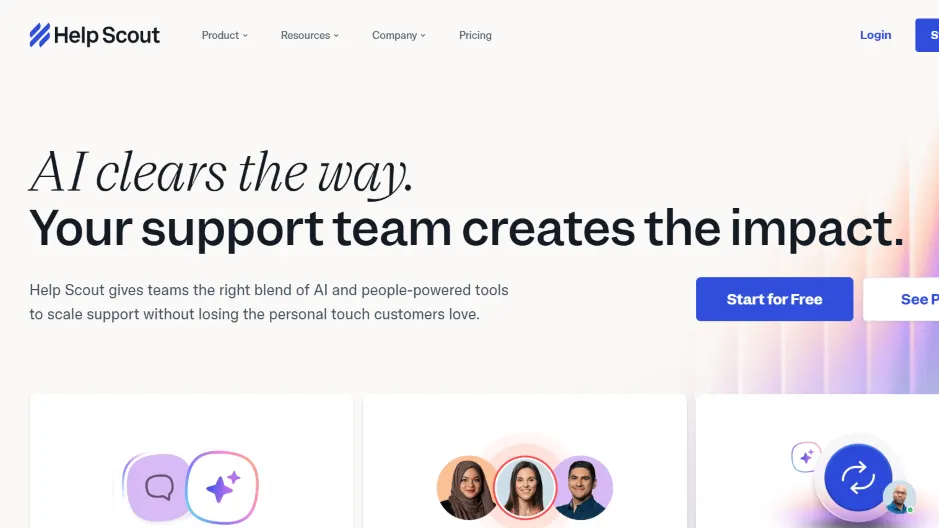
Help Scout keeps support conversational while adding structure, knowledge base software (Docs), and light automation.
Key features
- Collaborative inbox with collision detection & internal notes
- Docs' knowledge base and Beacon widget for chat + self-serve
- Light automation, saved replies, CSAT & basic analytics
- New model: unlimited users; pricing by monthly contacts
Pros: Minimal overhead; friendly UI; fast team adoption.
Cons: Fewer enterprise controls; limited native voice.
Pricing: New contacts-based packaging with unlimited users: Free $0 (100 contacts/mo), Standard $50 per 100 contacts, Plus $75 per 100 contacts, Pro starts at 1,000 contacts/mo with added features.
Best for: Small businesses, SaaS startups, and remote teams.
6. Zoho Desk - Best for budget-friendly automation and customization
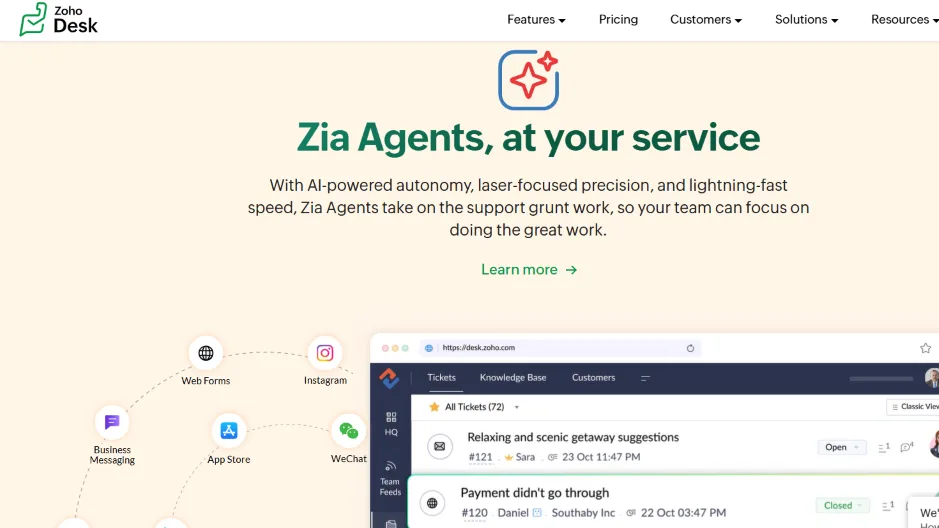
Zoho Desk couples low Total cost of ownership (TCO) with flexible workflow automation, CSAT tracking, and Zia AI suggestions.
Key features
- Omnichannel inbox (email, chat, phone, social) + KB
- SLAs, custom layouts/fields, workflows & approvals
- Zia AI: sentiment, auto-tagging, summaries, suggestions; new Zia Agents for autonomous tasks
- Deep Zoho CRM integration; dashboards & reports
Pros: Strong value; configurable processes; broad suite integrations
Cons: UI can feel dense; some features are gated to higher tiers
Pricing: Free tier plus Standard/Professional/Enterprise paid tiers; pricing varies by region/currency (toggle on page). Quote amounts differ by locale; confirm USD at checkout.
Best for: Small business, B2B SaaS, high-volume support.
7. HubSpot Service Hub - Best for native CRM & support alignment
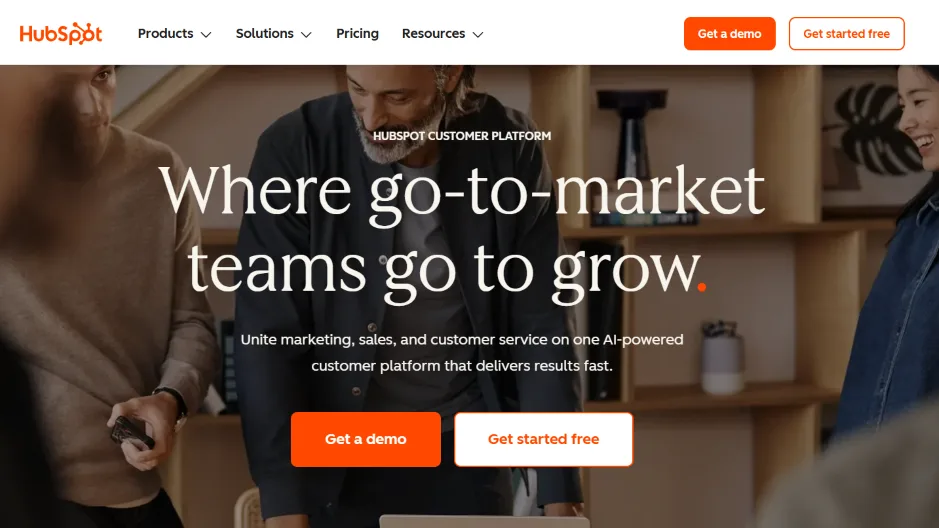
Service Hub ties customer service tools to CRM timelines so agents see deals, usage, and health beside every ticket.
Key features
- Shared inbox, customer portal, KB & feedback surveys
- Playbooks, workflows, and SLAs; omnichannel messaging
- AI features embedded across CRM + Service
- Deep alignment with Sales/Marketing ops
Pros: One data model; smooth handoffs with Sales/Success
Cons: Can feel expensive to configure; costs rise with scale
Pricing: HubSpot’s official pricing guide lists Starter $9/seat/mo, Professional $90/seat/mo, Enterprise $150/seat/mo (plus required core seats and add-ons depending on bundle).
Best for: B2B SaaS, enterprise, product-led growth
8. Salesforce Service Cloud - Best for complex workflows and data gravity

Service Cloud leverages Salesforce objects, flows, and reporting & analytics to orchestrate sophisticated service processes.
Key features
- Omnichannel routing across chat, email, messaging, and voice
- Case SLAs, Knowledge, macros, & embedded telephony
- Einstein AI for replies, routing, and summarization; Agentforce/Einstein 1 add-ons for advanced AI
- Native CRM context, dashboards, and data governance
Pros: Enterprise-grade extensibility; governance; ecosystem depth.
Cons: Implementation effort; licensing complexity.
Pricing: Public US pricing: Starter $25/user/mo, Pro $100, Enterprise $175, Unlimited $350; Agentforce 1 for Service $550 user/mo. Features and digital/voice add-ons can change the effective cost
Best for: Enterprise, B2B SaaS, high-volume support.
9. Gorgias - Best for ecommerce-style operations inside SaaS
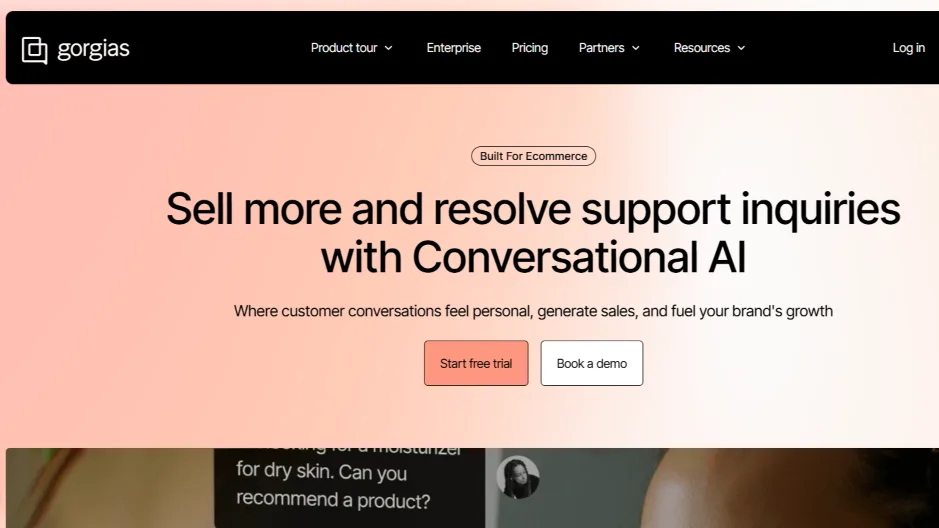
Gorgias brings fast responses with order and billing context, ideal for SaaS with transactional queries and store tie-ins.
Key features
- Multichannel inbox: email, chat, social, SMS
- Ecommerce data surface in-thread; macros & rules
- Automation for refunds, order status, cancellations
- Reporting on revenue impact and response SLAs
Pros: Excellent macros and templates; strong Shopify/Stripe context
Cons: Ticket quotas on lower tiers; narrower B2B depth
Pricing: Ticket-volume pricing; Standard $50/mo with tiered plans scaling by tickets and add-ons (e.g., AI). Exact inclusions vary by tier
Best for: Ecommerce brands, small businesses, high-volume support.
10. HappyFox - Best for an all-in-one help desk with clear workflows
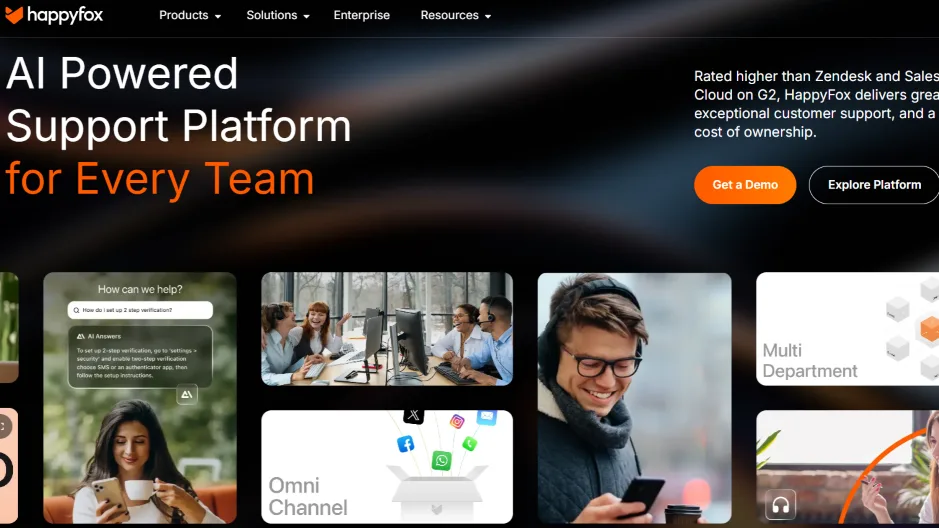
HappyFox balances ticketing system depth, tasking, and knowledge base software in a clean package.
Key features
- Ticketing with categories, SLAs, canned actions & Smart Rules
- KB, asset tracking options, dashboards & reports
- Choice of per-agent or unlimited-agent annual plans with ticket caps
- Chat/in-app messaging available as a separate add-on
Pros: Straightforward admin; good balance of features vs. cost.
Cons: Ticket caps by plan; add-ons for chat/in-app messaging.
Pricing: Per-agent, billed annually; multiple editions (Mighty, Fantastic, Enterprise, Enterprise+). Specific USD is shown on the vendor page with the feature matrix.
Best for: Small business, B2B SaaS, remote teams.
11. LiveAgent - Best for chat-first teams with built-in telephony
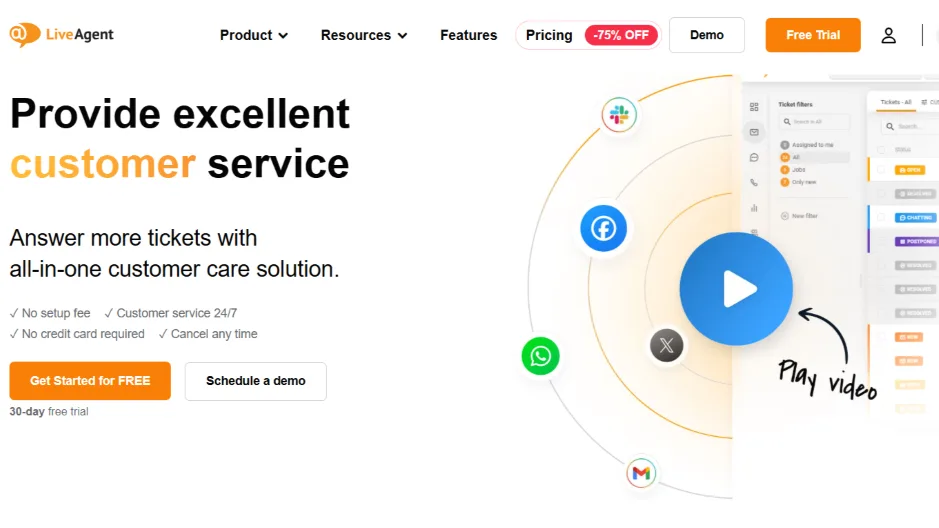
LiveAgent unifies chat, email, social, and calls in one console, with handy gamification for team motivation and quick setup.
Key features
- Live chat widget, call routing/IVR, shared inbox
- Social integrations, canned responses, tags
- Gamification for team motivation
- Reporting & SLA timers
Pros: Quick setup; good for chat-centric teams; integrated voice
Cons: UI feels utilitarian; advanced analytics are lighter
Pricing: Small $15, Medium $29, Large $49, Enterprise $69 (annual billing)
Best for tags: for small business · for remote teams · for high-volume support.
Leading SaaS Tools of 2025 [Compared]
AI help desk software in 2025
Modern AI help desk software is a full support engine. It blends ticket deflection AI, autonomous support agents, an agent copilot, and a gen-AI help desk layer that learns from your knowledge base, CRM, and product data. These AI customer support tools resolve routine requests before they hit the queue, guide agents during complex cases, and keep answers consistent across every channel.
Core building blocks
- Ticket deflection AI: Surfaces precise self-serve answers in chat, email, and web, then escalates only when needed.
- Autonomous AI agents: Execute Tier-1 tasks end to end (password resets, billing updates, order or status checks, basic troubleshooting) with secure actions and workflow rules.
- Agent Copilot: Drafts replies with sources, summarizes long threads, recommends next steps, and enforces SLA policies.
- Gen-AI knowledge synthesis: Consolidates KB articles, policies, and release notes so one source powers chat, email, voice, and apps without duplicating content.
Measured outcomes
Lower average handle time (AHT), higher first call resolution (FCR), smaller backlog, steadier quality, and cleaner CSAT tracking with structured reporting & analytics. Leaders gain visibility across omnichannel support while agents spend time on work that needs judgment. See automation impact →customer stories
How to implement
- Start with top intents for deflection and publish clear self-serve answers.
- Add guardrail actions for autonomous agents on high-volume tasks.
- Enable the copilot for summaries, suggested replies, and macro prompts.
- Connect CRM and product data so guidance stays accurate.
Deploy an AI support agent on Tickets, Chat, and Voice → explore the Customer Support Channels.
Implementation checklist: from trial to rollout
- Channel inventory: List every inbound path (Email, Chat, Social, WhatsApp, voice) and expected volumes
- Knowledge Base audit: Map top intents and gaps; modernize articles for deflection and agent reuse
- Workflows: Define routing, priorities, macros, and approval paths; document ownership by queue
- SLAs: Set response/resolution targets by tier and channel; align alerts and calendars
- Analytics baselines: Capture AHT, FCR, backlog, and CSAT before changes
- Pilot: Run a two-week pilot with one team and one high-impact channel; track deltas vs. baseline
- Full rollout: Expand channels, import historical data, enable crm integration, and train on playbooks
- Review cadence: Weekly QA on tickets and deflection; monthly dashboard review; quarterly roadmap updates
Need more details about KB to speed this up? Explore our detailed guide on AI‑Powered Knowledge Base
Key features to look for in a SaaS help desk
- Ease of use: Agents and customers navigate quickly; setup takes hours, not weeks.
- Scalability: Handles higher volumes, more channels, and stricter SLAs without a rebuild.
- Interconnectivity: Strong native and third-party integrations keep context in one place.
- Flexibility: Supports cross-team use (Support, Success, Product, Sales) with roles, views, and automations.
Finding the right fit
- Budget: Free tiers suit early validation; paid plans unlock automation, analytics, and security.
- Team size: Larger teams benefit from robust workflow automation, permissions, and QA.
- Industry needs: Align features to your motion (B2B lifecycles, ecommerce order data, regulated requirements).
Investing in the right customer service software in 2025 compounds across retention, expansion, and brand trust. Pair your tool with AI to accelerate results.
Summary
This guide to top SaaS support tools 2025 compares the best SaaS support tools across features, pricing, and use cases so teams can pick the right customer service software for speed, scale, and measurable outcomes. You will see how modern saas software blends omnichannel support, robust ticketing, knowledge base software, automation, and AI help desk software for lower AHT, higher FCR, and better CSAT.
Along with top 11 SaaS tools, you will also get: a clear methodology for how to choose help desk software; quick picks for startups, SMB, B2B SaaS, ecommerce, enterprise, remote teams, PLG, and high-volume support; and a practical rollout checklist from trial to full deployment.
The AI section explains deflection models, autonomous agents, agent copilots, and gen-AI knowledge synthesis across chat, email, voice, and WhatsApp. Book a demo
FAQs
What integrations matter for SaaS (CRM, billing, product analytics)?
Must-haves include
- CRM (HubSpot, Salesforce) for account, plan, and SLA context
- Billing (Stripe, Chargebee, Recurly) for refunds, invoices, and plan changes
- Product analytics (Mixpanel, Amplitude) for usage-aware replies
- Telephony & WhatsApp (Twilio, Exotel, Meta Cloud API) for calls/messages
- Collaboration (Slack) for alerts/approvals
Which help desk tools integrate best with AI support agents (for SaaS)?
For seamless AI support agent overlays, start with Robylon to automate Tier-1 across Tickets, Chat, WhatsApp, and Voice while your help desk stays the system of record. Strong bases include Zendesk (broad marketplace/APIs), Freshdesk (good coverage at lower TCO), Intercom (messenger + app ecosystem), HubSpot Service Hub (native CRM), Salesforce Service Cloud (deep CRM workflows), Zoho Desk (Zoho suite), and LiveAgent (built-in voice).
Can we deploy an AI SaaS support agent across Tickets, Chat, WhatsApp, and Voice without switching tools?
Yes, keep your help desk and add an AI layer that plugs into your KB/CRM, phone (Twilio/Exotel), and WhatsApp Business. The agent should
(1) Retrieve answers from your KB,
(2) Perform actions via APIs (create/update tickets, status checks),
(3) Handover to humans with full context, and
(4) Log every interaction back to the ticket.
Robylon AI is designed for this “overlay” model, so teams get automation without a platform swap.
Which tools balance omnichannel (email, chat, WhatsApp, voice) with strong analytics (CSAT, AHT, FCR)?
For a balanced package, shortlist:
- Robylon – layers AI deflection + autonomous agents across channels and pushes clean transcripts/metrics back into your help desk and CRM.
- Zendesk – mature omnichannel with deep dashboards and SLAs.
- Freshdesk – strong ticketing + automation, value pricing, clear SLA/AHT views.
- Intercom – messenger-led workflows with resolution/deflection reporting.
- HubSpot Service Hub – solid analytics tied to CRM timelines and health.
Salesforce Service Cloud – enterprise routing, Einstein insights, robust reporting.
What’s the difference between customer service software (2025) and SaaS help desk software?
Customer service software is a broad stack, with omnichannel messaging (email, chat, WhatsApp, voice), knowledge base, automation, and analytics (CSAT, AHT, FCR), often with proactive in-product messages and journeys.
SaaS help desk software is more ticket-centric, including queues, SLAs, macros, approvals, assignment, and reporting.
Which platforms fit enterprise or complex B2B SaaS?
Robylon, Zendesk, Salesforce Service Cloud, and HubSpot Service Hub for scale, workflows, security, and deep CRM context.
Which tools suit SaaS startups and SMBs?
Robylon, Freshdesk, Help Scout, and Zoho Desk for quick setup, value pricing, and practical automation.
How do I choose the best help desk software 2025?
Score tools on omnichannel depth, ticketing + automation, KB + chatbot deflection, AI capabilities, reporting/CSAT/SLAs, CRM integration, reliability, pricing, and user reviews.
What is a SaaS support tool?
It is customer-facing help desk software that centralizes email, chat, WhatsApp, voice, and in-product messages to manage onboarding, usage, billing, and renewals; built for external users of SaaS companies, not ITSM.

.png)



